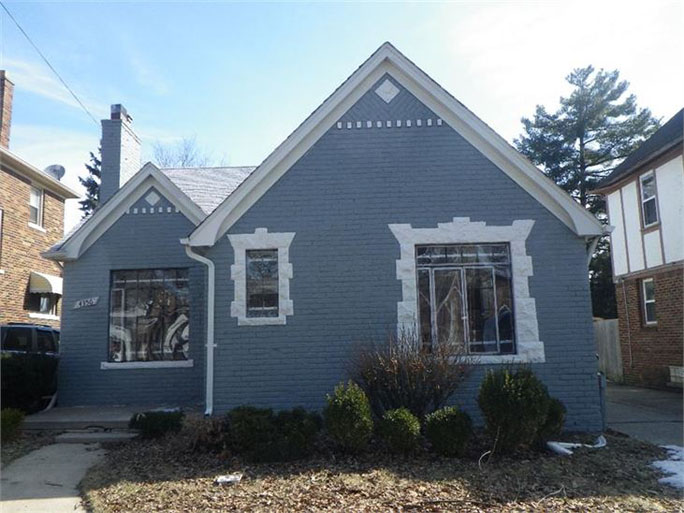The City of Detroit is offering cash towards housing to police officers, employees of certain businesses, income-qualified individuals, and even existing homeowners and renters as an incentive to relocate to or stay in the city. "Project 14" offers incentives to police officers and other qualified individuals. It provides $150,000 in housing renovation money and requires only $1,000 down for officers moving back to the city.
The name “Project 14” refers to the code used by police for indicating a return to normal operations. It is a pilot project that aims to reduce crime, strengthen relationships between public safety officials and the community, and revitalize Detroit’s neighborhoods. Neighborhood revitalization is being attempted through addressing the issues of public safety and vacant homes.
The program, started by Detroit Mayor Dave Bing and headed by Karla Henderson in the city’s Planning Department, is directed to moving police officers from the suburbs since fewer than half of Detroit cops are city residents. However, via the Neighborhood Stabilization Program, any individual may qualify with an income less than 120% of Area Median Income, good credit, and plans to live in the home. Based on gross household income, the housing-to-income affordability ratio is 33% maximum, while the debt-to-income affordability ratio is 42% maximum.
Applicants will apply for the program and select from an inventory of homes through the Detroit Land Bank Authority (DLBA). The homes feature modern floor plans, a minimum of two baths, garage, central air conditioning, energy efficient furnaces, and an appliance package. Furthermore, the houses will have high quality repairs, including the restoration of any architectural features.
The minimum down payment is a cash investment from the homebuyer of $1000. The homebuyer is allowed to purchase upgrades to the standard renovation package. The actual sale price of the homes will differ according to the final appraisal of the renovations, features, and any upgrades chosen by the homebuyer. It is likely that the homes will appraise in the range of $40,000 to $80,000. The monthly mortgage payment, including principal, interest, taxes, and insurance; should be in the range of $500 to $1000.
Homebuyers may obtain a mortgage through Michigan State Housing Development Authority (MSHDA) or find their own financing that meets MSHDA and Housing and Urban Development (HUD) guidelines. Other mortgage stipulations are no more than a repayment term of 30 years and not allowing an adjustable rate mortgage (ARM) or predatory lending interest rates and terms. Private Mortgage Insurance (PMI) can be avoided since assistance will be provided under a second mortgage from DLBA and MSHDA for up to 20% of home value and closing costs. The program also requires a minimum of eight hours of homebuyer education and credit counseling.
A separate initiative, “Live Midtown” is a “15 x 15” program that is trying to encourage 15,000 young people with at least a four-year degree to relocate to Detroit by 2015. If you work at Henry Ford Health System, Detroit Medical Center, or Wayne State University; you may qualify for housing incentives to live in the midtown area.
The incentives include an up to $20,000 matching forgivable loan for purchase of a primary residence; new renters receive allowances of $2500 for the first year and $1000 for the second year towards an apartment. If you already live in the district, you can receive $5000 in matching funds for exterior improvements to your home of $10,000 or more. Renters might be eligible for a $1000 allowance over one year towards the renewal of a lease or relocation within the district.
Project 14 and Live Midtown are both initiatives that complement the larger Detroit Works project. The project was started in 2010. It has short term actions and long term planning. City officials introduce short term actions, while contributing organizations led by the Detroit Collaborative Design Center (DCDC) are in charge of long term planning.
Some people resist moving back to the city of Detroit citing high insurance rates, lack of grocery stores, and safety issues. Efforts are being made to bring more grocery stores into the area and light rail up Woodward Avenue. Detroit isn’t the first city to use these types of attempts to encourage urban growth. Successful attempts have been seen in Boston, Cleveland, and Philadelphia.
CONTACT INFO
PROJECT 14
Ms. Juanita R. Jones
Managing Director
Detroit Land Bank Authority
313-974-6869
jjones@detroitlandbank.org
LIVE MIDTOWN
Midtown Detroit, Inc.
313-420-6000
This email address is being protected from spambots. You need JavaScript enabled to view it.
Detroit Medical Center
Human Resource Service Center
313-578-2287
This email address is being protected from spambots. You need JavaScript enabled to view it.
Henry Ford Health System
Employee Services
313-874-7100
This email address is being protected from spambots. You need JavaScript enabled to view it.
Wayne State University
Total Compensation and Wellness
313-577-3717
This email address is being protected from spambots. You need JavaScript enabled to view it.

